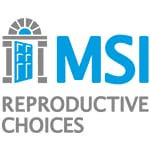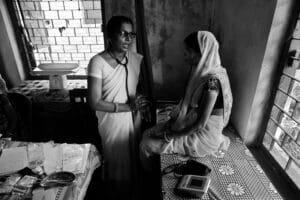Confronting Concerns About Family Planning Methods in Uganda
HIGHLIGHTS
- Concerns rooted in fears and misconceptions about contraceptive methods are common, frequently leading women to discontinue use.
- Working with Marie Stopes Uganda (MSU) and MSI Reproductive Choices, we equipped community-based mobilizers and health providers with materials to address concerns, enable concerned users to consider all of their options, and trigger providers to offer appropriate counseling.
The Challenge
In settings where health services are hard to reach or inconsistently available, long-acting reversible contraceptives (LARCs) are a safe and effective family planning (FP) option. LARCs can prevent pregnancy for up to 3-10 years and allow a woman to return to fertility upon removal whenever she’s ready to get pregnant. However, pervasive concerns about these methods often create barriers to their use. Some women for whom LARCs are a suitable option never use them, and others take up a LARC but discontinue use before they are ready to get pregnant due to concerns that are often rooted in myths and misconceptions.
Marie Stopes Uganda (MSUG) provides sexual and reproductive health services in under-resourced communities throughout Uganda through mobile outreach clinics. At mobile clinics, LARC users concerned about their methods often approach community-based mobilizers for information, guidance, and reassurance; however, mobilizers are not equipped with sufficient information on how to respond and often direct users to wait for the next clinic, which may be several months in the future. The long wait to resolve concerns and the hassles of getting to a clinic can entrench a desire to discontinue FP use, leaving concerned users less open to other service options that might better meet their needs. Roving teams of providers at mobile clinics working under pressure to serve a high volume of clients each day can easily miss opportunities to counsel concerned users about myths, side effect management, and alternative FP methods.
Our Approach
We partnered with MSI Reproductive Choices and MSUG to explore the behavioral dimensions of early LARC discontinuation. Our work aimed to encourage women who wish to delay pregnancy to access and continue using the methods that are best suited for their reproductive needs. Through observations and interviews with MSUG staff, clients, service providers, and community mobilizers at health facilities, we identified behavioral barriers contributing to the discontinuation of LARCs.
Together, we designed a solution set to support providers and community-based mobilizers to more effectively respond to clients’ concerns and allow concerned users to consider their full range of options, including side effects management and switching to alternative methods. The solution set was refined through user-testing with providers, mobilizers, and clients and then tested in the field by eight outreach teams over a six-month implementation period. These behaviorally informed solutions, outlined below, helped mobilizers to serve the role that clients expect of them while recognizing that mobilizers do not have the medical expertise of a healthcare provider.
- A client-facing visual tool for providers and mobilizers that includes accessible information using evidence-based approaches to counter myths.
- A side effects response tool that equips mobilizers to respond to concerns that may or may not be linked to a client’s contraceptive method.
- Referral cards that reframe the service options available for clients at clinics to reset expectations of what the answer to their concerns might be.
More information on these solutions can be found here.
Results
In a quasi-experimental evaluation, we saw positive trends in three measures of LARC continuation across all regions and statistically significant impacts on two outcomes in the Central region. Importantly, a process evaluation revealed that the solution set was well-received by community mobilizers and providers, who reported they helped improve their work with clients by streamlining interactions and equipping teams with messaging to respond to common concerns about LARCs.
Takeaway
These results offer promising evidence that mobilizers and providers can offer the information, guidance, and services that concerned users need. Community-based mobilizers are a trusted and important channel for disseminating information and addressing clients’ concerns, especially when access to clinic-based counseling is limited. However, many mobilizers are under-equipped and under-supported—their full potential as a trusted channel to provide relevant and credible information and to combat myths and concerns remains untapped.
When equipped with tools tailored to their context and knowledge level, community mobilizers can effectively support women to access the clinic services they need and continue to use LARCs when those methods meet their reproductive needs and goals.
Interested in our work applying behavioral science to global health? Email gh@ideas42.org or tweet at @ideas42 to join the conversation.
Partners










